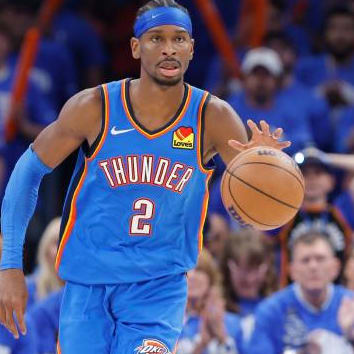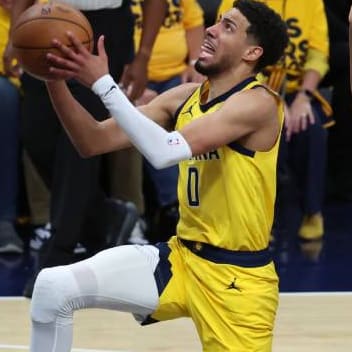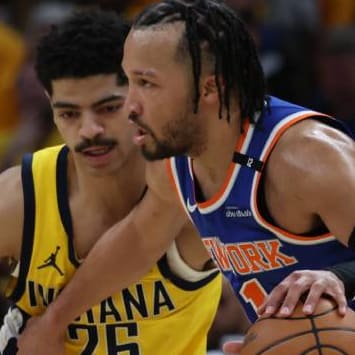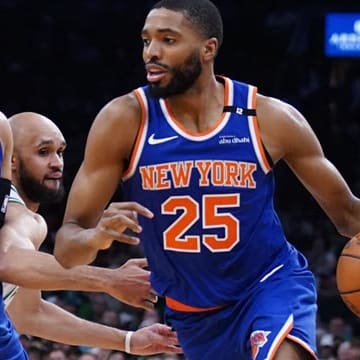This article is part of our NBA Team Previews series.
STATE OF THE FRANCHISE
Oh, what a good offense can do. After a disappointing 2008-2009 season left them lottery-bound, the Suns jettisoned the slow-moving Shaquille O'Neal, committed to then-interim coach Alvin Gentry, and refocused on the frenetic, fast-paced offense that has defined the franchise for the better part of the last decade. With the league's most prolific scoring attack back in high gear, Phoenix ran all the way to the Western Conference finals before falling in six games to the eventual champion Lakers.
Unfortunately, any good vibes generated from the unexpectedly deep playoff run were squashed by an offseason that was tumultuous at best and disastrous at worst. General manager Steve Kerr left the team and assistant GM David Griffin followed, leaving the front office in limbo until the Suns hired long-time player agent Lon Babby as president and former Cleveland assistant GM Lance Blanks as general manager.
The biggest loss, of course, was the departure of Amar'e Stoudemire via a sign-and-trade with the Knicks. A divorce between Stoudemire and Phoenix had been on the horizon for years, but that doesn't soften the blow or change the fact that the Suns now have a gaping hole in their frontcourt.
Phoenix will rely on a medley of players to fill the void, but no big man on the roster brings the kind of game-changing impact Stoudemire routinely provided. The primary offseason additions, including Hedo Turkoglu and Josh Childress, should ensure that the Suns remain one of the league's elite
STATE OF THE FRANCHISE
Oh, what a good offense can do. After a disappointing 2008-2009 season left them lottery-bound, the Suns jettisoned the slow-moving Shaquille O'Neal, committed to then-interim coach Alvin Gentry, and refocused on the frenetic, fast-paced offense that has defined the franchise for the better part of the last decade. With the league's most prolific scoring attack back in high gear, Phoenix ran all the way to the Western Conference finals before falling in six games to the eventual champion Lakers.
Unfortunately, any good vibes generated from the unexpectedly deep playoff run were squashed by an offseason that was tumultuous at best and disastrous at worst. General manager Steve Kerr left the team and assistant GM David Griffin followed, leaving the front office in limbo until the Suns hired long-time player agent Lon Babby as president and former Cleveland assistant GM Lance Blanks as general manager.
The biggest loss, of course, was the departure of Amar'e Stoudemire via a sign-and-trade with the Knicks. A divorce between Stoudemire and Phoenix had been on the horizon for years, but that doesn't soften the blow or change the fact that the Suns now have a gaping hole in their frontcourt.
Phoenix will rely on a medley of players to fill the void, but no big man on the roster brings the kind of game-changing impact Stoudemire routinely provided. The primary offseason additions, including Hedo Turkoglu and Josh Childress, should ensure that the Suns remain one of the league's elite offenses (especially as long as Steve Nash is alive and kicking), but defense and rebounding will again be a problem, perhaps more so now that Stoudemire is gone. We won't count a Nash team out, but this is a franchise in flux that will likely find itself scrapping and clawing for one of the West's final playoff spots.
PLAYING TIME DISTRIBUTION
Even at 36, Steve Nash is still clearly the straw that stirs the Suns' drink. His out-of-this-world conditioning allows him to play at a feverish pace for nearly 35 minutes per game. The only other point guard on the roster, Goran Dragic, will scoop up all of the reserve minutes, usually about 15 per game. Jason Richardson will again see 30-35 minutes as the starting shooting guard, with new acquisition Josh Childress seeing time at that position as well. Childress will be one of the first players off the bench and should get roughly 30 minutes between the shooting guard and small forward spots. Phoenix's overabundance of wing players makes it tricky to guess exactly how the playing time will shake out, but look for Hedo Turkoglu to get 30-plus minutes a night with Grant Hill seeing 25 or so. The new additions will likely cost Jared Dudley some burn, dropping him into the 18-20 range. In the frontcourt, Robin Lopez and Channing Frye should get 25-30 minutes each, with Hakim Warrick chipping in 20-25 off the bench. Earl Clark and Gani Lawal will fight for scraps.
PLAYER OUTLOOKS
Center:
Robin Lopez: With Amar'e Stoudemire gone, Lopez will move into the starting lineup and could approach 30 minutes per game considering the Suns' expected lack of depth up front. We got a glimpse of him as a starter last season, as he averaged 11.3 points, 6.2 rebounds and 1.1 blocks in 31 starts. If he's able to stay out of foul trouble, it's reasonable to expect similar numbers this year, making him a decent late-round breakout candidate to target.
Forward:
Hedo Turkoglu: Turkoglu's short stint in Toronto could best be described as a disaster, as he scored five fewer points per game than the season prior, saw modest declines in most other categories, and didn't make many fans in lovely Canada. More than anything, the culprit was a drop in minutes. After playing 36-37 per game the previous two seasons, Turkoglu averaged only 30.7 minutes in 2009-10. That alone is likely responsible for his minor drop in assists and rebounds. The more curious thing is the dramatic drop in shots for Turkoglu upon his move to Toronto; last season, he averaged four fewer field-goal attempts per game (including one fewer three-point attempt) and two fewer free-throw attempts than in the season before. Things are looking up in Phoenix, however, as the Suns' fast-paced offense has acted as a tonic to more than one player's fantasy numbers. His upside is probably close to his last season in Orlando in which he averaged 16.8 points, 5.3 rebounds, 4.9 assists and 1.7 three-pointers. That probably makes him a fine pick in the middle rounds.
Channing Frye: Frye went from an afterthought to a viable option in fantasy leagues last year after joining Phoenix – a move that changed his role on offense by putting him away from the basket. While Frye attempted a total of 70 three-pointers over his first four years in the NBA, he threw up 392 shots from downtown last season alone. As a result, he averaged 2.1 three-pointers, and his 0.8 steals and 0.9 blocks were helpful as well. Still, 11.2 points and 5.2 rebounds aren't too impressive, and you'll be at a major disadvantage on the boards if you make Frye your No. 1 center, though he'll be asked to contribute more on the glass with Amar'e Stoudemire gone. He was a nice surprise last season and could duplicate those numbers this year, but Frye has disappointed far more than he's lived up to expectations throughout his career.
Josh Childress: Childress spent the last two seasons in Greece, but he was a four-year player in Atlanta before that, so we have a pretty good sense of what he's capable of as an NBA player (11.1 points, 5.6 rebounds, 1.0 steals as a Hawk). Because his athleticism and willingness to run the floor make him a good fit for the Suns' fast-paced style, he should be able to duplicate those numbers in his first year in Phoenix. The biggest question is his shooting stroke; he's a 52.2 percent shooter in his NBA career (36.0 percent from behind the arc), but his unorthodox motion makes him inconsistent at times. If he shoots well, he could be a nice late-round sleeper.
Grant Hill: Hill's scoring average has fallen in each of the last five seasons, but he's still a solid member of the Suns' rotation, averaging 30 minutes exactly last year. It's hard for a player to be worthless with that kind of court time, and Hill wasn't (worthless, that is), contributing enough to finish as a top-125 player or so. However, the offseason acquisitions of Hedo Turkoglu and Josh Childress will cut into his minutes, and the end is approaching for the 38-year-old. Ultimately, his real value comes from the fact that he's not bad in any one category.
Hakim Warrick: Warrick is a capable bench scorer who should fit in nicely as a pick-and-roll partner for Steve Nash. However, Amar'e Stoudemire he is not, and just because he seems to be in a good situation doesn't mean he's a lock for reliable fantasy production. He's a poor defender and doesn't rebound nearly as well as his physical tools indicate that he could.
Jared Dudley: In his first NBA season (with Charlotte), he shot only 9-for-41 on trey balls, and only 12 percent of his total shots were of the three-point variety. Then, in December of 2008, he was sent to Phoenix and immediately became a bomber, hitting three times as many long balls as the season before in only half the time. Last year, he improved even more, hitting 1.5 threes at a 45.8 percent rate. With Grant Hill and Jason Richardson continuing to man the wings, and Josh Childress and Hedo Turkoglu now in the fold, it's unlikely that Dudley surpasses last season's 24 or so minutes. As a result, he's only useful if you're seriously short on threes.
Earl Clark: Clark still has some long-term potential, but he did next to nothing as a rookie last season and now has several new wing players (Hedo Turkoglu, Josh Childress) to contend with for minutes.
Gani Lawal: He's a high-energy player who could provide some hustle and defense off the bench, but his offensive potential is so limited that he'll likely never be much of a fantasy contributor.
Guards:
Steve Nash: Nash was at the heart of last year's playoff run, running the offense (11.0 assists) and scoring with remarkable efficiency (16.5 points, 50.7 percent from the field, 42.6 percent from three, and a league-leading 93.8 percent from the line). However, the loss of Amar'e Stoudemire and the Suns' decision to replace him with a hodgepodge of role players will make this season in Phoenix decidedly different. Of course, fronting a less-talented team might not be the worst thing for Nash's fantasy numbers; he could be required to score more often, and he's a remarkably efficient scorer. It will be interesting to see how he works with Hedo Turkoglu – another highly adept facilitator.
Jason Richardson: Richardson represents an interesting case entering the 2010-11 season. Though it would be unwise to say that his first full year in Phoenix was a disappointment, it certainly represented a change in roles. Consider: last year, Richardson averaged 15.7 points and 31.5 minutes per game. The former was the lowest for Richardson since the 15.6 he averaged in his 2002-03 season with the Warriors (only his second season in the NBA). As for the latter? Well, actually, it was the fewest minutes that Richardson has ever averaged on a per-game basis. Field-goal and free-throw attempts (12.6 and 2.3, respectively) were also at an all-time low for the former Michigan State standout. On the other hand, as happens to talented players who adopt smaller roles, Richardson's efficiency generally approved. After having never before posted a shooting percentage north of 45 percent, that's exactly what he's done in Phoenix, shooting 48.8 for 58 games in 2008-09 after coming over from Charlotte and, last season, shooting 47.4 with the Suns. Also, during his time in Phoenix, Richardson has scored 13.4 points for every turnover – a rate that few NBA players can boast. On top of all this, what bears noting is Richardson's excellence in the playoffs, where, through 16 games, he averaged 19.8 points, 33.8 minutes, 13.9 shots and a spectacular 3.0 three-pointers per game, while shooting 50.2 percent. With Amar'e Stoudemire now gone, that increased scoring emphasis displayed in the postseason could carry over to 2010-11.
Goran Dragic: Dragic showed flashes of his potential while coming off the bench for the Suns last season, including a 26-point outburst against the Spurs in the playoffs. He'll be in a reserve role once again, but look for Dragic to see additional playing time now that Leandro Barbosa has been traded to Toronto.
Sleeper:
Robin Lopez: Lopez's numbers as a starter last season (11.3 points, 6.2 rebounds, 1.1 blocks) were pleasantly surprising, and he may be poised to improve both his scoring and rebounding as he takes on a more prominent role following the departure of Amar'e Stoudemire. With perilously little frontcourt depth, the Suns may use Lopez for 30-plus minutes per game if he's playing well.
Bust:
Grant Hill: Hill has missed just one game over the last two seasons, which – considering his injury history – is truly a testament to both his conditioning regimen and to the Suns' training staff. He was a serviceable fantasy reserve last season, but with a glut of wing players on the depth chart and Hill's legs not getting any younger, there is almost no upside here.









